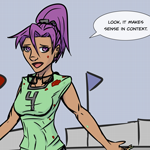Question and Answers, April 22nd.
So I had a pile of a questions from emails and so forth, so it seemed like a good time to put out a Q&A to make the answers more widely available, and give a broader range of people a chance to ask questions.
We’ve had questions from a few different groups of people – regular readers looking for more depth to the setting, people interested in (or critical of) the process, and some newer visitors that probably don’t have the advantage of hundreds of pages of comments and previous Q&As.
As such, I’ve divided the questions in roughly three buckets. Comic World and Setting Questions, Character Questions, and General Questions. Note that I have paraphrased questions, either for clarity, politeness, brevity, or generalization. If I’ve overly paraphrased your question, feel free to chime in below.
Feel free to skip around to the section that applies to your questions.
Comic World and Setting Questions
Q. Does everyone know about Eidos & Magic? How has the discovery of magic impacted science and religion?
Obviously it depends on where to an extent, but I think it’s safe to say an overwhelming majority of people are aware of magic in the world’s we’ve seen. The evidence is a little too widespread. There was once a “masquerade” in Central where magic was known to only select groups, but that was blown during the Incursion.
Eidos more a domain knowledge of using magic, and more of interest to mages, scientists and philosphers than the average person.
Magic has had rather large ramifications to science, but does not fundamentally change or contradict it. Physics governs the “rules”; magic is the console commands that provide a limited bypass to them. Directly reading Eidos data to understand more about the world is very challenging.
While Religion certainly interacts with the changes of the world, I’d doubt there would be many fundamental impacts. Religion tends to adapt to the world around it.
Q. Can magic effect how quickly people age? Can technology?
Yes, in theory, to both. Age is incredibly complicated collection of physical changes, but at the end of the day it’s just a set of physical changes; manipulating factors involved without a complex understanding would be dangerous with either approach, though.
It remains to be revealed if there if there is a “general solution” to aging, but such a thing would have very large societal ramifications if it were to exist.
Q. Why do designer children have unnatural hair colors?
For reasons that have not been fully explored in comic, that’s the law in Malsa. Why society would have an interest in making the subjects of genetic manipulation easily identifiable or if that’s a good idea are larger questions with longer and far complicated answers.
Not all countries have the same laws, but most of the places with more advanced genetic manipulation programs tend to (Malsa being a great example) and they are occasionally followed in places that don’t as it’s sort of become a precedent.
Q. Are there other magical schools like Levenworth out there?
There are quite few, there are even several others in Malsa, though Levenworth is sort of on it’s own tier in Malsa, there are many international schools that are far larger with their own programs, histories, and stories.
That said, Levenworth is somewhat famous for accepting people of unique profiles, as well as being part of Malsa’s naturalization program (attendance to Levenworth grants temporary Malsan citizenship, and graduating makes it permanent); with Malsa’s raising stature in the increasingly intertwined magic and science communities, this makes it an an attractive option.
Q. Is “Central” an analog to the real Earth?
Someone familiar with the real Earth would probably find a globe of Central to have some familiarity, but would have a lot of trouble passing a history test.
More will probably be revealed as the comic continues.
Q. Are there supernatural creatures?
Supernatural.
Adjective
- (of a manifestation or event) attributed to some force beyond scientific understanding or the laws of nature.
Hmm. I’m a little torn on this. If the question is “outside the possible understanding science” -> no. But neither is magic in this setting, you just have to know the math behind Eidos. Outside the current understanding of science? Definitely.
Q. Is there such a thing as “Magical Space Flight” in either “Central” or Palindra.
Has someone been to space using magic? Certainly. Is it the easiest way to get to space? Not usually.
Magic is super useful for zero gravity propulsion though, as being able to directly modify the speed without needing to strictly worry about something to push off is a big deal in space. Getting to space with magic is trickier though as physics is really sort of a bitch about that (second rule of magic).
Cooperative magic (several mages working together) is actually usually quite hard as magic interferes with magic, and it’s rare for a mage to have the power to make big enough changes for something like escape velocity themselves. Even normal flight is outside of the range of most mages; we’ve only seen two people fly and they both cheat in different ways to do it.
Q. Are there larger spells? Spells that take minutes or hours to cast? Non-Combat Spells?
Most magic takes longer than then seconds to cast. The main qualification of a combat mage is to be able to calculate with almost superhuman reflexive speed, either with autocaster assistance or not. Many humans can technically use magic with a tactile autocaster and enough time (though using an autocaster itself requires a certain understanding of Eidos that can be very difficult to explain as there are not really words for interacting with math that doesn’t apply to reality, thus the necessity of the not well understood concept of an Eidos Key). People are far more likely to be able to use magic to some extent after having seen it and knowing it is possible, without that most people simply can’t approach the concept.
Magic used in scientific research (temporarily bypassing the laws of physics can be oh so very useful for a lot of things it turns out) frequently is set up over the course of days, and cast over the course of minutes by autocasters that more closely resemble supercomputers. This sort of research is still sort of in it’s infancy though, as autocasters are themselves fairly new, and the scientific and commercial/industrial implications and applications are just hitting stride.
That said, magic that effects the very small and the very large are both very hard. There are hard gates to what the human mind can really grasp. We think we understand molecular chemistry, but not in the way that would be required to actually edit it with deliberate intentional in a literal sense (due to rule one). While a lot of magic affects change on the molecular level, intentionally controlling that is very hard.
Effecting things further from the caster is also hard. In theory magic could be used to, say, modifying the weather, but the reality of that spell is so vast and complicated that it could not be easily accomplished.
We’ve seen one instances of people using a Fortress classification spell though, which is a spell that usually requires several powerful mages working together with a specialized autocaster and very detailed vast environmental data compiled into it.
Q. Concerning the process of creating physical objects with magic, what sort of things can be created and what can’t be created? What the economic effects of this?
While mages can bypass the conversation of energy/mass and create something from “nothing”, creating stable matter is something that is out of reach of most mages (rule one, two and three, really). While many very powerful mages could create “matter”, to create specific matter that has more than superficial properties (such as “is hard”) the mage would have to have either a natural gift for something like that, or a vast understanding of physics and molecular structure.
While it seems like the IDS creates gas with magic, realistically what they are doing is using magic to disperse an existing compound into the air typically (though they’d usually like you to think they are creating it from nothing).
In theory a mage can effect chemical compositions, but typically they are less accurate than you might hope, and typically have to heavily rely on their Key to process the gap between what they want and can calculate and the reality of what the change implies in Eidos.
That said, magic can be used to create conditions that allow the creation of materials that otherwise science would find incredibly difficult, as with a good understanding of physic, rules can be narrowly and specifically suspended or modified allowing some pretty nifty stuff.
Q. Is SMAI research illegal? If so, was Query created legally?
Depends on who you ask. Typically it is somewhere between strongly discouraged and not understood. Most people in the setting would not really know where to start with making an AI like that, and the ones that could would usually realize why it was a bad idea.
Query wasn’t created in secret, but it is unlikely many people knew the details behind his creation, and what exactly a SMAI is a more open question than what may be readily apparent.
We, in the real world, have search algorithms that adapt and learn. In the most literally sense, this is a SMAI, but not how the term is used in the comic typically. That said, where one draws the line between “adaptive search algorithm” and “self modifying artificial intelligence” is perhaps less obvious than it might seem.
Q. Why are all the secretaries teal haired?
I have no idea, are they? I’d have to go back and check. Teal is the most popular color for female designer children though, so it’s likely to be something of a coincidence.
Q. Is it possible to read someone’s mind with magic?
Technically, I suppose, but reading Eidos data has a great deal of complications, and dealing with the Eidos data of a Form that has a key is a whole ‘nother mess.
Someone that exceedingly good at understand and parsing Eidos information on a subconscious level (as the human mind can’t so much handle Eidos data without the Key processing into understandable concepts) can look for specific “flags”, but a comprehensive understanding would probably be more data than a human mind can process; thoughts are actually quite complicated.
Q. Who is the strongest mage in the comic?
Good question. Depends on what the contest is I think.
Q. How old is Naomi?
I don’t think I’ve noted anyone’s specific age, but I think “young adult” is probably the range.
Q. Does Naomi have any siblings? Does Kally have any siblings? Does Peter have any siblings?
It has been implied that both Kally and Naomi have at least a sibling each, but we haven’t met either of them yet. We’ve actually just seen Peter’s sister.
Q. [Questions about character X’s orientation.]
It’ll come up if it comes up. Typically speaking with haven’t seen a lot of relationships between characters as most of them have other things on their minds. Statistically speaking, you can usually make a guess.
Q. How old is Ila?
By some reckoning, a few days. By maybe another maybe a couple months to a year? Really depends on how you consider it.
Q. Are ever going to update the Lore page again? The Cast page?
It is squarely on the to-do list. If there is a particularly subject or person you’d like updated, feel free to let me know.
Q. You complain a lot about not having enough time, have you considered hiring an artist?
I have considered it. Does not really economically make sense at the moment. Currently I only plan to do this if I cannot continue to produce the comic otherwise (I don’t want to leave the comic unfinished, that’d be mean).
Alternatively, if a good match comes along I would consider it. Good and reliable artists are very expensive though (for good reason, doing art is hard career!).
Q. How much money does the comic make? How many people read the comic?
I cover expenses at this point, mostly due to the one ad directly beneath the comic and the generous folks over on Patreon. It is something I’m incredibly amazed and greatful for that so many people have decided to support the comic.
It certainly isn’t a living wage (or a minumem wage per hour) but to me doing things is a three way equation of “Do I enjoy it” + “Do people pay more for it” + “Is it something I will be glad I did in the future”. Under that math, it currently makes sense to keep going, and plus I’d really hate to let down people by leaving it unfinished. Someday I hope to apply more time and effort to this sort of thing, and maybe figure out how to make part two of that equation make better sense; in a large part I see a future where I am a better artist and writer that comes from the current day. And if it doesn’t end up that way, it’s a fun hobby I’ll probably have for life.
As for readership, it’s hard to estimate. Rough analytics would suggest over the course of it’s life time the comic has been read at least in part by nearly 100,000 unique people, with millions of total page views; that said, it has roughly 1,500 unique weekly visitors with more than half being returning, so I’d say at any given moment we probably have maybe 700-1000 people reading weekly, which is somewhere between amazing, terrifying, humbling and mind blowing. While I know in the grand scope that’s not a big number, it’s a huge number to me considering what this is and where it started.
Q. Adblock.
Have a few questions around this, so: use adblock if you want use adblock.
I like readers more than I like a few pennies. Those had have followed for awhile know I am not really thrilled by the concept of ads and don’t really want to be in the business of telling people they should look at ads, but it doesn’t make sense to take out the last one under the comic as it’s a significant amount of the money I make from this still (and I leave the PW up mostly because I sort of like Project Wonderful rather than the have any real impact the economics).
Q. How do you get so many comments?
I honestly don’t know. It started with a few awesome people has sort of snowballed from there to a lot of awesome people. I don’t think it’s something I can claim credit for, I think it mostly boils down to “give people something to talk about” and “be lucky and get amazing people to read your stuff”.
I think it sort of builds off itself. If there are no comments, people are less inclined to comment. Once there are a few comments, discussions are more likely to spark. It also several months to year in that it started getting any comments, and sort of grew from there over the next year into what I view as a significant value add to the experience of the comic for both me and the readers at this point
Thanks, people. You are awesome.
Q. Do you want feedback or constructive criticism?
I mean, feel free. I make no promises that I will listen to it, but feedback is usually helpful. I would in general recommend you email this sort of thing rather than leave it in the comments, as I delete comments I view as likely to incite less pleasant conversations (will still read your comment though). Most things are not really something that have an easy solution though. I’ve gotten better as a writer, story teller, world builder, and artist since I’ve started, and I don’t think that’s a journey that’s even half complete, and may never even be half complete.
Q. The art is blah blah blah.
Trust me, I know. 🙂




Anyone that says the art is blah blah has not tried creating art on any level that makes them a valued expert in that field.
You are creating something new and unique where is they are only taking you down because they are unable to make something new and unique themselves. Any idiot can break something. It takes a smart person to create something new.
Do not feed the trolls.
As to why you get comments: the kinds of people who most often write comments are those who like to speculate/theorize. The story is very prone to speculation, between reasonably clear rules of magic (etc.), fairly rational actors, and mysteries both created and solved at a steady rate. Thus, you have attracted a decent sized community of that sort of person, so you get a decent number of very in-depth comments.
Accessability of the comments section (vs. a separate forum, plus no required logon) helps too. So does an actively commenting creator.
Interesting comparing comment numbers to estimated reader numbers. Shows the “1% extremely active engagement” rule of thumb quite well.